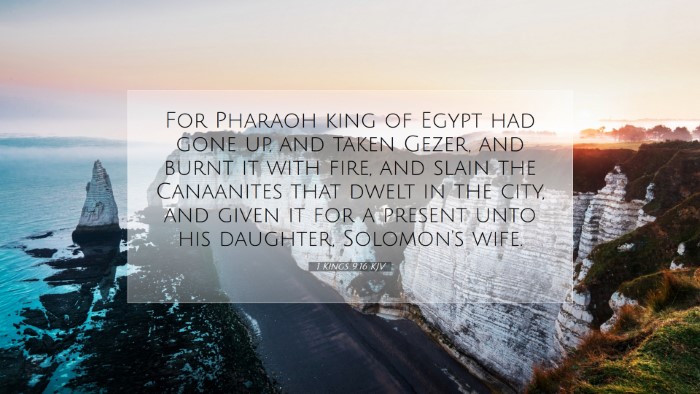Commentary on 1 Kings 9:16
Verse: "For Pharaoh king of Egypt had gone up, and taken Gezer, and burnt it with fire, and slain the Canaanites that dwelt in the city, and given it for a present unto his daughter, Solomon's wife."
Introduction
This verse presents a historical incident that plays a crucial role in the narrative of King Solomon and offers rich theological insights. Understanding the significance of Gezer and its acquisition serves to highlight the complexities of Solomon’s reign—marked by political alliances, military conquests, and the establishment of a nation rooted in both divine favor and human ambition.
Historical Context
-
The mention of Pharaoh indicates the political dynamics between Israel and Egypt during this time. The king of Egypt’s actions reflect a significant military presence and intervention in Canaan.
-
Gezer was a strategic city located on the border of the Canaanite territories and could serve as a vital stronghold for protecting trade routes, which emphasizes its military importance.
-
This city’s burning and the massacre of its Canaanite inhabitants reveal the violent realities of conquest in the ancient world and reflect the ongoing tensions between different ethnic groups in the Promised Land.
Theological Implications
The acquisition of Gezer is not merely a military transaction but has profound theological implications. It illustrates several key themes:
-
The Complexity of Human Leadership:
Solomon's reign is often presented as a time of peace and prosperity; however, this incident reveals the darker realities that accompany political power, demonstrating how peace can sometimes be built upon violence.
-
Divine Providence:
While Solomon's actions involved human politics and alliances, they also fulfill God's promises regarding the land of Israel, showcasing that history is under divine control, even when it appears chaotic.
-
Marriage Alliances:
The marriage of Solomon to Pharaoh's daughter highlights the practice of using marriage as a diplomatic tool. This union has mixed implications for Israel’s faithfulness to God, as it often leads to idol worship.
Insights from Public Domain Commentaries
Matthew Henry
Matthew Henry emphasizes the idea that God made the kingdoms of the earth to serve His purposes. He highlights that the act of Pharaoh taking Gezer was used as a tool in God's grand plan, even as it serves a human alliance through marital ties.
Albert Barnes
Albert Barnes notes the significance of the Canaanites' defeat in Gezer. He argues that Solomon’s diplomatic and military strategies directly influenced Israel’s stability, and that the subjugation of local inhabitants was integral to the formation of Israel’s national identity.
Adam Clarke
Adam Clarke gives a broader context by asserting that the conquest and gift of Gezer reflect the interplay between divine sovereignty and human action. He posits that while Solomon was noted for wisdom, his decisions relating to alliances with neighboring nations often had spiritual repercussions.
Lessons for Modern Readers
This verse serves as a profound reminder of the complexities of governance and alliances in contemporary times. As ministers and leaders navigate the political landscape, they must balance the need for peace with the ethical implications of their decisions. Kirching these lessons from history allows for a reflective approach to modern leadership.
-
The Importance of Ethical Leadership:
Understanding the potential cost of political alliances can lead to a more ethical approach to leadership in both church and community.
-
Divine Guidance in Decision Making:
Leaders are reminded to seek divine wisdom in their decisions, ensuring that their actions align with God's broader plans rather than solely human ambitions.
-
Awareness of Cultural Influences:
As Solomon navigated foreign influence through marriage, today’s leaders must discern the cultural pressures that may sway them away from their foundational beliefs.
Conclusion
1 Kings 9:16 encapsulates a pivotal moment in Israel’s history, fraught with cultural, political, and theological layers that continue to resonate today. It serves as a warning as well as a lesson for those in positions of power and influence, urging a faithful posture towards God's design in the tapestry of history.


